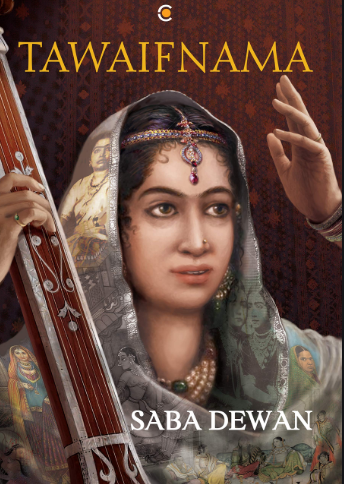In her book, Tawaifnama, Saba Dewan handles a subject which has already been circulating in academia and pseudo-academia for a couple of decades or so: the tawaif and her place in Hindustani classical music. It is a popular subject, for it lends itself well to 21st century sensibilities about women’s space, freedom and empowerment. Dewan does not stop at the popularity index, but delves deeper into it, sometimes at the cost of being blunt and contemporarily realistic.
It is well established and, by the dint of its establishment, accepted with a casual shrug of the shoulder, that the histories and contributions of tawaifs are to be glossed over in any chronological or categorical account of Hindustani classical music. It is acknowledged that at least Kathak and the purab ang of thumri evolved from the art of the tawaifs. It is ‘known’ that tawaifs were entertainers, singing, dancing and warming the beds of men from the wealthy elite class. This last aspect has wormed its way into social memory and stayed there. Colonialists, and later nationalists, were to blame for this particular one-sided view, which evolved into the stigma that social memory continues to associate with the tawaif community. What memory elides are the facts that tawaifs were the literati among the women of their age, accomplished in life skills, cultured in politics, and considered as useful members of society. Few care that their criminalization by the British raj destroyed their community, after which they never recovered their former glory or way of life. This elision is what Saba Dewan represents in Tawaifnama.
As the microhistory of a family, the tale is both representational and emblematic by Dewan’s own admission. One is reminded of several books about courtesans, particular and general, say, Biththan Bai by Reba Muhuri, that similarly represent a generic bai’s life, although none is as de-romanticized as Dewan’s.
In the introduction to the book, Dewan speaks of her 19-year-long search for the phenomenon of the tawaif, beginning before her documentary, The Other Song, “Where did the tawaif live in the city’s memory, I wondered as I tried to trace her... everywhere [I] received one answer: the tawaif was dead... Almost everyone insisted that they had no idea...” Contrary to claims and suppositions, she discovered how the lineage had not died out yet, but gone underground. Dewan details the life not of an individual but an entire family, spanning three generations, beginning with Dharmman Bibi, Sadabahar and Bindo, and coming down to the unnamed storytelling partner addressed only as ‘you’. Full of apocrypha and anecdotes, the changing circumstances of the family are nevertheless situated within the greater narrative of the changing history of contemporary India.
There is much more to this book than can be fitted into this review; reformist movements and their impact on tawaifs; a symbiotic and requisite attachment to patriarchal structures; an expurgation in the name of morality that still continues; vanishing pluralities of existence; current academic fads about marginalized communities; modern-day musicians trying to sponge off fading tawaifs; and the spaces, always the spaces that women occupy. A comprehensive, clear-sighted, and necessary book, Tawaifnama is not just a sensitive handling of the topic, but also a demand for a more positive acknowledgment of things past, and things as they are. When populist achievement of moral hegemony is a looming possibility, such demands should not stop at a revival of interest, but become a re-evaluation of a significant aspect of our past.

'Tawaifnama' By Saba Dewan, Context, Rs 899 Amazon

